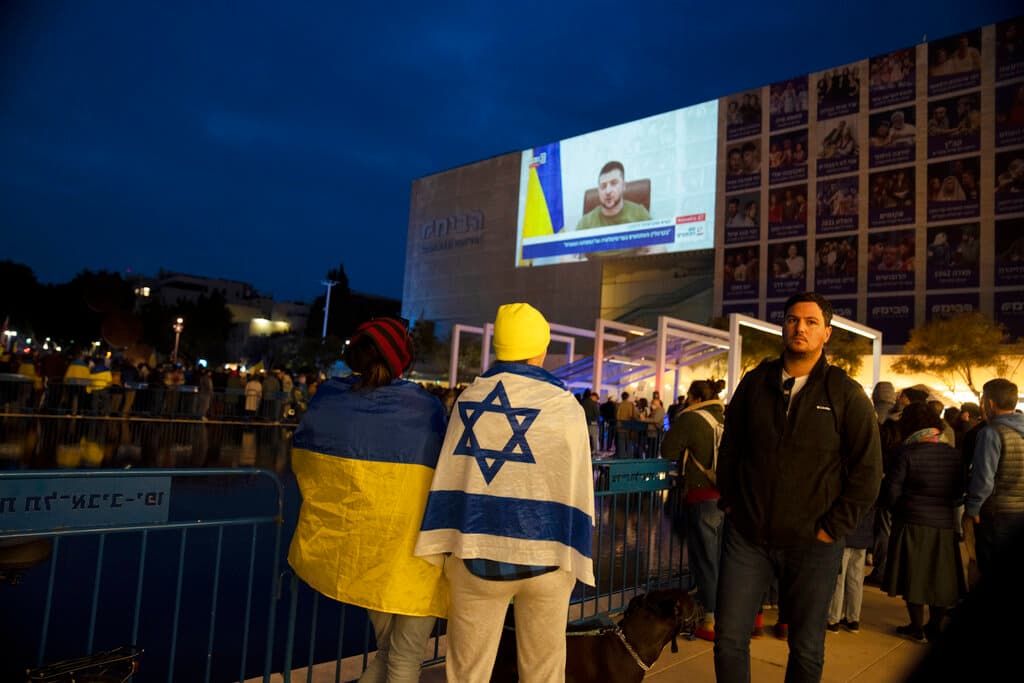Zelensky Treads a Delicate Line While Exhorting Israel To Increase Aid
Russia ‘wants to destroy everything that makes Ukrainians Ukrainians,’ he said, and the country’s Moscow-controlled press ‘calls it a final solution.’

As in President Zelensky’s address to Congress and the British and Canadian parliaments, the Ukrainian leader used today’s speech to the Knesset to call for solidarity among allies — as well as to sharply challenge Israel to “get off the fence” and do more to help his country.
Multiple explicit comparisons of Ukraine’s plight to the horrors inflicted by the Nazis did not sit well with many Israelis.
While some in the American press have compared Ukraine’s plight to that of Palestinians — and Russia to Israel — Kiev sees the Jewish state as its ally, albeit one that doesn’t yet do enough to help.
Of the Knesset’s 120 members, 112 logged in to Zoom to listen to the words of Ukraine’s first Jewish president, the free world’s man of the hour. Some orthodox legislators who participated in an earlier funeral of a top rabbi skipped the session. So did members of the United List, a leftist Arab party that, as one of them tweeted, opposes “nationalists and persecutors of the Communists in Ukraine.”
The short Zoom session was broadcast on a large screen at Habima Square in Tel Aviv, where thousands of Israelis came to show support, waving the blue and gold Ukrainian flag.
The stage was set for Mr. Zelensky, and by the end of his speech he went for the jugular: “Israel knows very well that your Iron Dome missile defense system is the best,” he said. “We can ask why we cannot get weapons from you?”
In his speech to Congress, Mr. Zelensky quoted President Kennedy and Martin Luther King Jr. Speaking to the British parliament, he cited Winston Churchill. For the Knesset, he recalled a “Ukrainian that you all know very well” — Golda Meir, the Kiev-born Israeli prime minister.
The entire first part of Mr Zelensky’s speech was peppered with appeals for solidarity and comparisons to the time of the Nazis. He said the date of Russian invasion of his country, February 24, was “the same day back in the 1920s when the Nazi party was founded.”
Now, he said, Russia “wants to destroy everything that makes Ukrainians Ukrainians,” and the country’s Moscow-controlled press “calls it a final solution.” That is one reason, he said, “the Ukrainian and Jewish communities were always connected.”
For Israelis the uneasy reference to a dark hour when too many Ukrainians joined in the Nazis’ hunt for Jews may have been a bit much. Mr. Zelensky also mentioned the recent Russian hit in the vicinity of the Babi Yar memorial, the significance of which has been refuted by a prominent Israeli reporter.
Yet Mr. Zelensky is widely admired in Israel, and his appeal to Ukrainian-Israeli solidarity was well received, which is why he used it as a prelude for his call for more help than Jerusalem currently gives his country.
“Can you explain why we are still calling on the whole world … and asking for help?” he said. “What is that? Indifference? Or mediation without picking a side? Indifference kills.”
Alluding to Prime Minister Bennett’s attempt at compromise between Moscow and Kiev, Mr. Zelensky paraphrased one of Golda Meir’s famous quips: “We would like to live, but our neighbors want us dead. That doesn’t give us much room for compromise.”
Until recently Mr. Zelensky had hailed Mr. Bennett’s attempts at mediation. Now, in a clear sign that the effort has failed, he called on Israel to take a clear stand siding with his country.
After the speech, Foreign Minister Yair Lapid vowed Israel will “continue to help the Ukrainian people as much as we can and will never turn our backs to the distress of people who know the horrors of war.”
Yet Israel’s realities may be a bit more complicated than Mr. Zelensky would like.
The Israeli air force depends on cooperation with Russia as it conducts an intensive campaign to keep Iran and Hezbollah off Israel’s northern border, in Syria. Russia controls Syria’s air space, and its threat to end communication with Jerusalem could lead to fatal dogfights between Israeli and Russian pilots.
Additionally, Moscow has agreed to avoid hitting an Israeli team that is about to complete building the largest field hospital inside Ukraine, according to press reports.
So as he did in speeches to American, British, and Canadian legislators, Mr. Zelensky is asking for additional help, especially in arms, but Jerusalem is far from a fence-sitter.
Meanwhile, several press outlets attempted to compare the suffering of people in Gaza to that of Ukrainians under the Russian guns. “We’ve been through all the wars here and never left,” a Ukrainian woman living in Gaza, Nataliya Harb, was quoted as saying by the Associated Press.
Back in Ukraine, though, most compare their situation to Israel’s history at war, which explains why they expect more of Israel — even as prominent Palestinians support Mr. Putin’s stance against an “American puppet,” and Arab Knesset members boycott Mr. Zelensky’s speech.

